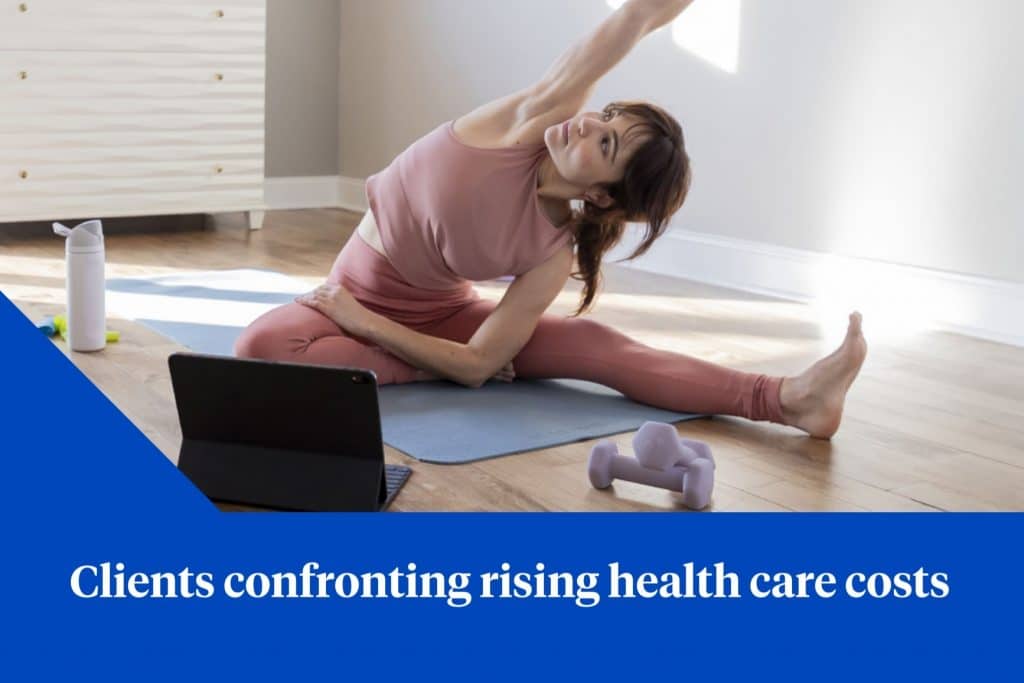Columbus, OH – To combat high inflation, Americans have made tough trade-offs that are negatively impacting their health and well-being, according to a new survey from the Nationwide Retirement Institute®. Over the past 12 months, nearly two in five US households (40%) have received food or goods from a food bank (22% for Millennials), and the same number (17%) have stopped buying healthier foods (organic or high-priced healthy). food).
Nearly one in five Americans (18%) report skipping meals or not shopping due to high inflation (including 28% of Gen Z and 23% of Millennials). As food insecurity worsens, Americans are also struggling to afford essential health care expenses. Many have canceled or postponed plans in the past 12 months to see a specialist (14%), take prescribed medication (10%) or have an annual physical exam (11%) due to high inflation. Nearly a fifth of Gen Z (17%) and Millennials (19%) have canceled or postponed plans in the past 12 months to see a mental health professional.
“As the price of health care and basic necessities continue to reach record highs, Americans have been forced to make difficult decisions that sacrifice their health and well-being,” said Kristi Rodriguez, senior vice president of the National Retirement Institute. “While these decisions are understandable and difficult, making short-term trade-offs can have long-term impacts. Neglecting your health now can lead to far greater costs as you age and approach retirement. This is such a critical time to consult a financial professional for create a plan that prioritizes your health care needs now and in retirement.”
As Americans brace for even greater spending in the future, survey finds one in ten (10%) have cut their retirement plan contributions in the past year to pay for expenses healthcare due to high inflation. Another 14% of adults plan to reduce their contributions this year, and that number is higher for Gen Z and Millennials at 21% and 20%, respectively.
To find additional savings, 14% of Americans say they are considering downgrading their health insurance plan due to high inflation, which is 23% and 20% for Gen Z and Millennials, respectively.
One area of potential relief for people already age 65 and older is the review of their Medicare plans during open enrollment, which runs through Dec. 7. According to the National Council on Aging, only about 10% of people switch Medicare plans each year during open enrollment, which could mean they’re spending too much on coverage they don’t need or don’t need. not use.
“It’s important for people to use online tools and resources in addition to leveraging a finance professional,” Rodriguez said. “For example, seniors could save money now by re-evaluating their health insurance plan during open enrollment.”
Finance professionals can help keep Americans on track to meet their short- and long-term financial goals
Although Americans make daily decisions and trade-offs to manage high inflation, many don’t have a plan in place to pay for short-term health care expenses and stay on track to meet their long-term retirement goals. term. For instance:
- Less than a fifth of Americans (17%) have adjusted their family’s budget to pay for healthcare expenses in the past 12 months
- The majority (72%) say one of their biggest fears in retirement is that their healthcare costs will spiral out of control, but only 39% have a plan to pay for healthcare costs in retirement.
- 15% have postponed a major purchase or investment to pay for healthcare expenses in the past 12 months
“The role finance professionals play in creating a more secure financial future for their clients is even more important in times of high inflation,” Rodriguez said. “By integrating health care into financial planning conversations, finance professionals can help clients better prepare for rising health care costs.”
To help finance professionals guide these conversations, Nationwide Health Care Costing Tool uses proprietary health risk analysis and up-to-date actuarial cost data to help financial professionals and clients estimate future medical and long-term care expenses.
To help guide customers through their health insurance options, Nationwide® partnered with the National Council on Aging (NCOA) to create the The NCOA My Medicare Matters® tool is brought to you by Nationwide. Consumers can learn more and complete an assessment at https://nationwide.mymedicarematters.org/.
Benefits Report Card® is an NCOA tool that helps people with Medicare determine if they may be eligible for Medicare Savings Programs and Medicare Supplemental Assistance – two programs that help cover healthcare costs for low-income people and moderate.
To learn more about the National Retirement Institute’s 2022 Retirement Health Care Costs Consumer Survey, visit www.nationwide.com/healthcareinsights.com. Additionally, finance professionals can visit www.nationwidefinancial.com/healthcareinsights to learn more.
Survey methodology
The research was conducted online in the United States by The Harris Poll on behalf of Nationwide among 1,140 adults aged 18 and older residing in the United States (“national sample”), including 283 Gen Z (18- 25), 285 Millennials (26-41), 286 Generation X (42-57), 286 Boomers+ (58+). The survey was conducted from August 26 to September 8, 2022. Data is weighted where necessary for persons aged 26 and over by age, sex, race/ethnicity, region, education, marital status, household size , household income and propensity to be online to bring according to their actual proportions in the population. Gen Z (18-25) data is weighted by age, gender, race/ethnicity, region, education, household size, and propensity to be in line.
About the Harris Poll
The Harris Poll is a global consulting and market research firm that strives to uncover the authentic values of modern society to inspire leaders to create a better future. She works with clients in three main areas: building 21st century corporate reputation, developing brand strategy and performance tracking, and earning organic media through PR research. One of the oldest surveys in the United States, The Harris Poll has tracked public opinion, motivations and social sentiment since 1963, and is now part of Stagwell, the challenger holding company created to transform marketing.
